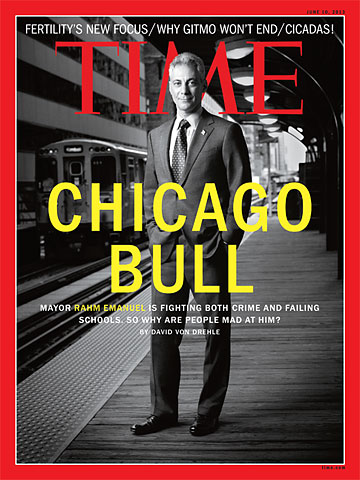
In a one-party town like this one, all great conflicts are intramural. Republicans pose no threat to Chicago Mayor Rahm Emanuel as he enters the third year of his four-year term, gunning for re-election. It's his fellow Democrats who are scheming to destroy him. Consider Cain and Abel, the Yorks and Lancasters, Michael and Fredo Corleone: family conflict is often the deadliest.
Skirmishing among Chicago Democrats escalated to all-out war after the mayor's handpicked school board voted on May 22 to shutter 50 city public schools. Facing a billion-dollar deficit in the schools budget, Emanuel had good reason to tackle the problem of half-full buildings and underperforming kids. But this giant step--no American city has closed as many schools at one time--was guaranteed to provoke.
Sure enough, the Chicago Teachers Union, a power unto itself, loosed its heavy artillery, with its president, Karen Lewis, calling Emanuel "the murder mayor" when the closings were announced. "He's murdering schools. He's murdering jobs," she said. Neighborhood leaders charged that the closures targeted majority-black schools with majority-black faculties. "Does [Rahm's] new Chicago mean no black folks?" asked Valerie Leonard of North Lawndale on the city's West Side. At a rally against the school closings, people roared as 9-year-old Asean Johnson proclaimed, "This is racism!" "Children will die," a protester cried at another gathering, presumably because they will have to walk farther to school through gang-troubled streets; the accusation was soon echoed on placards waved for the evening news.
Strong stuff. And it follows a tumultuous 2012 for the mayor, who weathered a seven-day strike by the teachers and struggled to get a handle on a spike in gun violence. According to a recent poll, Emanuel has lost support among black Chicagoans--who were vital to his easy victory in 2011--while his overall approval rating hovers at 50%. The mayor's efforts at school reform, urban redevelopment, infrastructure repair and job training all seem to irritate the status quo in favor of other, often corporate, interests. Changes he has made in the police department have put a dent in crime, but that hasn't won him the confidence of residents who experience the worst of it. Watching him court corporations and plot strategy with hedge-fund plutocrats, some of whom cut his campaign six-figure checks, Emanuel's enemies have dubbed him "Mayor 1%."
This factious city's gift for turning disagreement into Armageddon is a proud part of its identity. "Stormy, husky, brawling," Carl Sandburg famously wrote of Chicago. For more than half a century, the culture has favored the get-along, go-along machine politics of the Richard Daleys, the legendary Boss and his shrewd, stumble-tongued son. They reigned over Chicago by husbanding power and spreading favors, not always tending to the long term. No Daley was crazy enough to cross the teachers' union or tangle with the unionized janitors at O'Hare airport.
